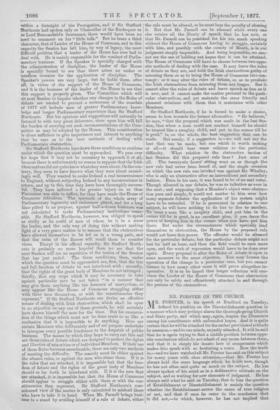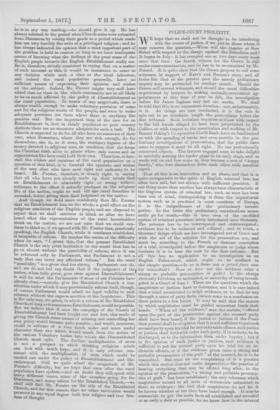MR. FORSTER ON THE CHURCH.
UR. FORSTER, in his speech at Bradford on Tuesday, ill defined his position on the Disestablishment question in a manner which may perhaps alarm the thorough-going Church and State party, and which may, again, inspire the Dissenters among his constituents with unfounded hopes. And it is quite certain that he will be attacked for the rather provisional attitude he assumes,—and to our minds, unjustly attacked. It will be said that he is again trying to find a middle position between oppo- site conclusions which do not admit of any mean between them, and •that it is simply his innate love of compromise which makes him speak with so hesitating a voice. Now the truth is,—and we have watched all Mr. Forster has said on this subject for many years with close attention,—that Mr. Forster has always held the same language which he holds now, though he has not often said quite so much on the subject. He has always spoken of his mind as in a deliberative attitude on the subject, and as waiting for new elements of judgment. He has always said what he said on Tuesday, that to him the question of Establishment or Disestablishment is mainly the question whether the Establishment serves the cause of true religion or not, and that if once he came to the conclusion that it did not,—to which, however, he has not implied that, he is in any way tending,—he should give it up. He has always referred to the period ,wheirChurah-rates were extracted from Dissenters by seizing their goods as a period which made him see very forcibly the evils of a privileged religion ; and lie has alwa.ys indicated his opinion that a most impottant part of the problem is held in reserve'so long as we have inadequate means of knowing what the feelings of the great mass of the English people towards the English Establishment really are. He is, therefore, strictly .consistent in saying that on a matter of such moment as this, it would be monstrous to come to any decision while such a class as the rural labourers, and indeed the rural population generally, .1neve no sufficient means of expressing their opinions and wishes on the subject. Indeed, Mr. Forster might very well have added that no class in the whole community are at all likely to he so much affected by the policy of Disestablishment as the rural population. In towns of any magnitude, there is always wealth enough to make voluntary provision of some sort for the religious wants of the people, and even to make adequate provision for them where there is anything like genuine zeal. But one important item of the ease for an Establishment is, that in thinly populated or poor country ,districts there are no resources adequate for such a task. The .Church is ,expected to do for all who have no resources of their own, what Dissenters, where they are rich enough, do for themselves ; she is, as it were, the residuary legatee of the money devoted to 'religious uses, on condition that she keeps the Christian faith alive in places where only means and an organisation like hers could hold their own. Therefore, to fore- stall the wishes and opinions of the rural population on a ,question of this kind, is to forestall the opinions and wishes of the very class who have most right and authority 'to he heard. Mr. Forster, therefore, is .clearly right in saying that all who have not already made up their minds that an Establishment is absolutely right or wrong without' reference to the effect it actually produces on 'the religious, life of the nation, ought to wait till the rural franchise is accorded, before giving their final judgment on the matter. And though •we hold more confidently than Mr. Forster that an Establishment has, on the whole, a good .effect on the religious condition of the English 'people, and are disposed to expect that we shall continue to think so after we have heard wthat the representatives of the rural householders think on the matter, we are not sure that we could eon- tinue to think so, if we -agreed with Mr. Forster that, practically speaking, the English Church, while it .continues established, is incapable of reform. He touches the centre of the 'difficulty when he says, "I 'grant this, that the present Established Church is the only great institution in the world that has to go on almost without the possibility of -reform, .since it can be reformed only by Parliament, and Parliament is not a body that can carry any effectual reform." But the word 4‘ possibility" is a great deal too strong. Parliament can do, and we do not feel any doubt that if the judgment of thei nation, 'when fully given goes clear against Disestablishment, it will do, what the Parliaments of some of our Colonies have. already done,—namely, give the Established Church a con- stitution under which it may provisionally reform itself, though, of course, Parliament would admit no legal validity to such reforms without the express sanction of the Legislature. This is the only way, we grant, in which a reform of the Established Church, eo long as it remains an Establishment, would be possible. But we believe that if once the campaign of the friends •of Disestablishment had been fought out and lost, this mode of giving the Church ,senee means of revising
and controlling her
own policy would become quite possible ; and would, moreover, result in reforms of a very much wider and 'more useful character Ian any which would 'result from the actien Of the various Voluntary bodies into which the Disestablished Church mast split. The further multiplication of sects is not ,a prospect to which thinking religious minds can look with much hope, and it is only reforms con- sistent with the multiplication of Beets which could be carried out under the policy of Disestablishment and Die- endowment. :Still we quite admit the magnitude of Mr. Forster's difficulty, but we hope that even after the rural population have spoken,—and no doubt they will speak with many different voices, sonic of the counties 'going for the ,Dissenters, and nanny others for the Established Church,—we shall still find %Ir. Forster on the side of the Established Church, and for this reason, that no other institution would promote in .E213' 'equal degree both true religion and true free- dom of thought.































 Previous page
Previous page